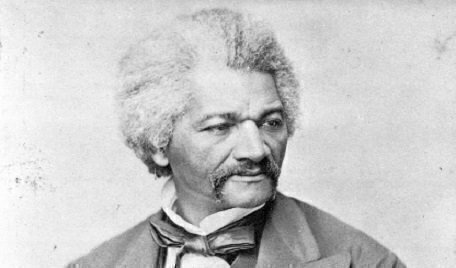/https://tf-cmsv2-smithsonianmag-media.s3.amazonaws.com/filer/a1/77/a17766d7-a1fe-4d6a-8417-d4e9de67b388/2013_239_10_001.jpg)
The story behind the Frederick Douglass birthday celebration (National Constitution Center)
On February 14, 2022, America will observe the birthday of the iconic Frederick Douglass. While the year of his birth has been narrowed down to two possible candidates, the actual month and day Douglass was born are still unknown.

In his autobiographical writings, Douglass believed he was born in the month of February, and he thought the year was 1818.
Douglass wrote about speaking in 1877 with Captain Thomas Auld, one of his former owners, on Auld’s death bed. “I told him I had always been curious to know how old I was and that it had been a serious trouble to me, to not know when was my birthday. He said he could not tell me that, but he thought I was born in February 1818.” Douglass had been told by Auld’s former wife, Lucretia, that he had been born in 1817.
In 1980, historian Dickson Preston published evidence from the Maryland Archives that showed a ledger from Aaron Anthony, Douglass’ first owner. The birth ledger listed “Frederick Augustus son of Harriott, Feby 1818.” Frederick was born as Frederick Augustus Washington Bailey and his mother was Harriet Bailey. But Preston also believed the notation in the ledger was added at a later date.
In My Bondage and My Freedom, Douglass recalled his last meeting with his mother, where she presented him with a cake. “The ‘sweet cake’ my mother gave me was in the shape of a heart, with a rich, dark ring glazed upon the edge of it. I was victorious, and well off for the moment; prouder, on my mother’s knee, than a king upon his throne,” he wrote. Preston said Douglass later may have speculated that his birthday was somehow connected to Valentine’s Day.
Late in his life, the Bethel Literary Society in Washington, D. C. decided to honor Douglass on his birthday in 1888. The event received a good deal of publicity. According to an account in the Washington Evening Star, the event was held on February 28, 1888. After the other dignitaries spoke, Douglass took the stage as he twirled his glasses.
“I understand from some things that have occurred since I came in that you have been celebrating my seventy-first birthday. What in the world have you been doing that for? Why Frederick Douglass. That day was taken from him long before he had the means of owning it. Birthdays belong to free institutions. We, at the South, never knew them. We were born at times: harvest times, watermelon times, and generally hard times. I never knew anything about the celebration of a birthday except Washington’s birthday, and it seems a little strange to have mine celebrated. I think it is hardly safe to celebrate any man’s birthday while he lives,” Douglass said.
In 1891, Frederic May Holland wrote a Douglass biography about four years before Douglass died. “It has been a source of great annoyance to me, never to have a birthday,” Holland reported Douglass as saying in a private letter. “He supposes that he was born in February 1817, but no one knows the day of his birth or his father’s name,” Holland said.
Douglass died in Washington, D.C. from an apparent heart attack on February 20, 1895. The following year, the Bethel Literary Society met on February 18 to celebrate Douglass’ birthday. The Washington Post said that Douglass had decided during his lifetime to use Valentine’s Day to make his birthday. “After he got his freedom he celebrated St. Valentine’s Day as his birthday, since he felt he had a good a right to have a birthday as other people, and he liked the traditions surrounding that date.” The society noted their scheduled meeting date was close to the Valentine’s Day holiday.
In subsequent years, local schools for African-American children started marking the observed birthday as “Douglass Day.” In 1897, the Post said that celebration was held on February 13, since the holiday fell on a Saturday. Douglass’ two sons presented a drawing of their father to the principal of the segregated high school on M Street, which had a building named for Douglass. The city had also made Douglass Day a holiday for its segregated schools.
By 1901, Douglass Day was being observed in a similar fashion in Chicago and other cities.
Scott Bomboy is the editor in chief of the National Constitution Center.